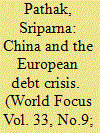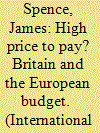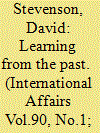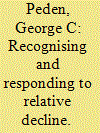| Srl | Item |
| 1 |
ID:
116207


|
|
|
| 2 |
ID:
117352


|
|
|
|
|
| Publication |
2012.
|
| Summary/Abstract |
One of the toughest issues at the time of UK accession to the EEC was the cost of being a member of the European club. The nature of the industrialized British economy ensured that the benefits of initial access were less pronounced than in other, longer-standing member states and quickly became a source of heated debate. Margaret Thatcher fought to get 'her money back' in the 1980s and the ensuing British rebate has become totemic for British politicians. As the European Union debates its next multi-annual budget, why has the budget proved so tricky for the UK? What are the drivers for the EU budget? And what is the rebate all about? This article argues that the UK has tugged in different directions over the EC-now EU-budget, which amounts to about 2 per cent of the Union's public expenditure. At times the UK has urged member states to improve financial management. At times it has pressed for greater redistribution between rich and poor regions through the budget. It has consistently criticized the large proportion of the budget going to support agriculture in the Union. It has, from the earliest days of its accession negotiations, argued about how much it contributes to the EU budget and how it should contribute less, whether it counted among the poorer or the richer member states. Britain has argued first for restraint, rather than promoting certain policy sectors in a consistent manner. While cohesion and competitiveness targets outlined in the 2000 Lisbon Strategy received strong support from the UK government and the Europe 2020 goals set concrete growth targets in line with the UK's own, this policy-shaping is tempered by constraint and restraint, and has not allowed the UK to draw full political benefit from the EU budget.
|
|
|
|
|
|
|
|
|
|
|
|
|
|
|
|
| 3 |
ID:
131399


|
|
|
|
|
| Publication |
2014.
|
| Summary/Abstract |
This article is based on an inaugural lecture for the Stevenson Chair in International History, given at the London School of Economics (LSE) in October 2012. It re-examines the origins in Britain in the 1920s of the academic discipline of international history, focusing on the partnership between the LSE and Chatham House. It highlights the differences among the discipline's founders between broader and more tightly defined conceptions of its subject matter and scope, identified respectively with Arnold J. Toynbee on the one hand and with Harold Temperley and Charles Webster on the other. It also underlines the founders' agreement about international history's practical applicability, particularly for analysing and even for helping to prevent the outbreak of major wars. It explores the theme of 'learning from the past' by investigating the interconnection between the diplomatic crises of July-August 1914 and October 1962, reappraising John F. Kennedy's use of history to inform statesmanship. The article points to a recurrent pattern in the international conjunctures of 1914, 1939 and 1962 that may be replicating itself again today. It concludes that a knowledge and understanding of international history can indeed yield insights of practical value, though must be drawn on flexibly and with imagination.
|
|
|
|
|
|
|
|
|
|
|
|
|
|
|
|
| 4 |
ID:
138266


|
|
|
|
|
| Summary/Abstract |
GOVERNMENTS across the developed world still face acute fiscal difficulties. Even where, as in Britain, there has been a return to sustained moderate economic growth, the recovery has not produced a comparable rise in tax revenue. Despite the rise in employment in the British economy since 2011, tax receipts from income tax have fallen substantially. A recovery in significant part based on part-time jobs and self-employment has not, and cannot, repair Britain's fiscal hole, particularly since the Coalition government has raised the tax-free allowance on income. Internationally governments have made little progress on cooperative measures to address the revenue lost to tax havens and aggressive tax avoidance.
|
|
|
|
|
|
|
|
|
|
|
|
|
|
|
|
| 5 |
ID:
120422


|
|
|
|
|
| Publication |
2013.
|
| Summary/Abstract |
It became increasingly apparent in the 1950s that Britain was in long-term relative economic decline. However, during far-reaching reviews in 1959-1963 of future policy, the Foreign Office and the Treasury could not agree that timely strategic retrenchment would be an appropriate response. Ministers believed that Britain would remain a world Power; the British economy continued to be handicapped by higher levels of defence expenditure than those of other western European Powers; and it took an economic crisis to force a decision to withdraw from east of Suez.
|
|
|
|
|
|
|
|
|
|
|
|
|
|
|
|